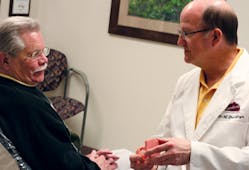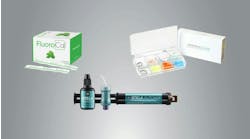By M. Dean Wright, DDS
I began placing dental implants in 1977, and in those days the procedure was quite a hard sell. Patients simply did not know what dental implants were, and there were almost no patients who came into the office requesting them. At the time, implant treatment was also prohibitively expensive for the vast majority of patients.
Today, it's exciting to see the progress the industry has made. Now, not only do many patients often learn about dental implants on their own and come into the practice requesting specific types, but dentists also have a much wider variety of treatment options to offer patients at more affordable prices.
This makes dental implants a much easier sell than they were in the past. But we still cannot overlook the fact that getting implants is a major decision for patients -- both for their oral health and their finances. Coupled with strategic marketing tools and tactics, we must offer thorough and careful guidance to help patients make the best choice.
Many of the implants placed in my practice are for the purpose of stabilizing dentures. There are essentially three treatment paths that we typically present in this situation.
The first option is denture stabilization with mini dental implants (MDIs). This is the most economical and efficient option for patients since these implants can be placed and loaded in a single day. They do not require as much bone as traditional diameter implants. This makes them a suitable option for a broader range of patients. Their less-invasive placement procedure is also appealing, particularly for senior-aged patients who prefer minimally invasive treatments. Since they do not require cutting a flap, they are relatively simple for the dentist to place. In my practice, this procedure typically costs $4,500-$5,000.
I also present patients the option of traditional diameter implants. These implants require a three- to four-month healing period and are significantly more expensive than MDIs. But some patients do opt for these heavier-duty implants for the maximum stability they provide.
RELATED | An alternative to conventional dental implants: short implants
Finally, the third option that I present to edentulous or partially edentulous patients is the option of having implants placed -- MDIs, traditional dental implants, or a combination -- and placing a full crown and bridge roundhouse over them. This is obviously the most intricate and expensive option. But we inform patients that this is the treatment that will be the closest to getting their natural teeth back.
It's also not unusual for our practice to see patients who are simply interested in getting dentures, and do not express an immediate wish to have implants to stabilize them. In these cases, we strongly encourage the patient to consider implant stabilization in order to avoid many of the issues that come with dentures.
But we also counsel them that if they need time to save the money for implants, we can treat them with the denture right away and retrofit it for implants when they are ready. Many, many denture patients later return to our practice to have this done.
Helping patients make the choice
Given the choice between denture stabilization with MDIs or traditional dental implants, or a crown and bridge roundhouse, a strong majority of patients opt for 3M ESPE MDI treatment. In my mind, it's the same as showing a car buyer a Chevrolet, a Mercedes, and a Maserati. Most people are going to buy the Chevy because it fits their budget and meets their needs. A few will choose the Mercedes, and perhaps one in a million will buy the Maserati.
That being said, we are proud to offer the "Chevy" implant option. It actually does have some advantages compared to traditional implants beyond just its lower cost. As noted above, 3M ESPE MDIs require less bone than traditional implants. For patients who are concerned with denture stability and simply want to feel more confident eating and socializing, the cost of MDI treatment is a great value.
RELATED | What are the best types of abutments for implants?
While 3M™ ESPE™ MDIs are the most popular option in my practice, we are always conscientious about presenting patients with the full range of choices that are appropriate for them. We keep in mind that it's not about what we the dentists want; it's about what patients want. We work hard to educate them thoroughly on the differences between each choice.
Only after having a complete dialogue and listening carefully to patients' goals can we make the best recommendations. We also offer financing by CareCredit to help bring treatments within financial reach for patients, so that they can make their decisions based on what's best for their health and lifestyle, and not just based on what they can immediately afford.
Making marketing work for you
Getting patients in the door is one of the biggest challenges for any dental service, let alone something as significant as implants. After building my practice for decades, we are finally at a point where the awareness and word of mouth for our services spreads easily. But I also believe a number of marketing choices we made have paid off well for us.
First, our office is located on a busy street. During an office expansion a few years ago, we installed signage for the "Cambridge Dental Implant Center," a separate brand from our Cambridge Family Dentistry practice. This step alone has been outstanding free advertising. We have also invested in TV ads and an infomercial, which have helped us explain and illustrate services.
Additionally, our website features extensive information about dental implants, highlighting the different types of implants, who is a good candidate, FAQs, and how the procedure works. Our site also features video testimonials from patients. We maintain a list of patient references, who are more than happy to talk to others about their experiences with implants and our practice.
The combination of these tactics means that many times, by the time new patients come to our office, they have almost sold themselves on getting implants. This is strong evidence for just how uncomfortable many patients are with dentures, or with a single missing tooth. The embarrassment and self-consciousness they feel is so strong that they are highly motivated to research their options and invest in a treatment that will make a difference.
Dentists who are ready to treat these cases stand to benefit not only financially, but also to experience the gratification of performing a treatment that makes an outstanding difference in the quality of life for patients.
M. Dean Wright, DDS, has been placing implants since 1977, and has to date placed and restored more than 14,000 implants -- both traditional and small-diameter. Dr. Wright is the owner and director of Cambridge Family Dentistry, a 20-operatory general practice and implant center located in Wichita, Kan. Contact him by email at [email protected].







